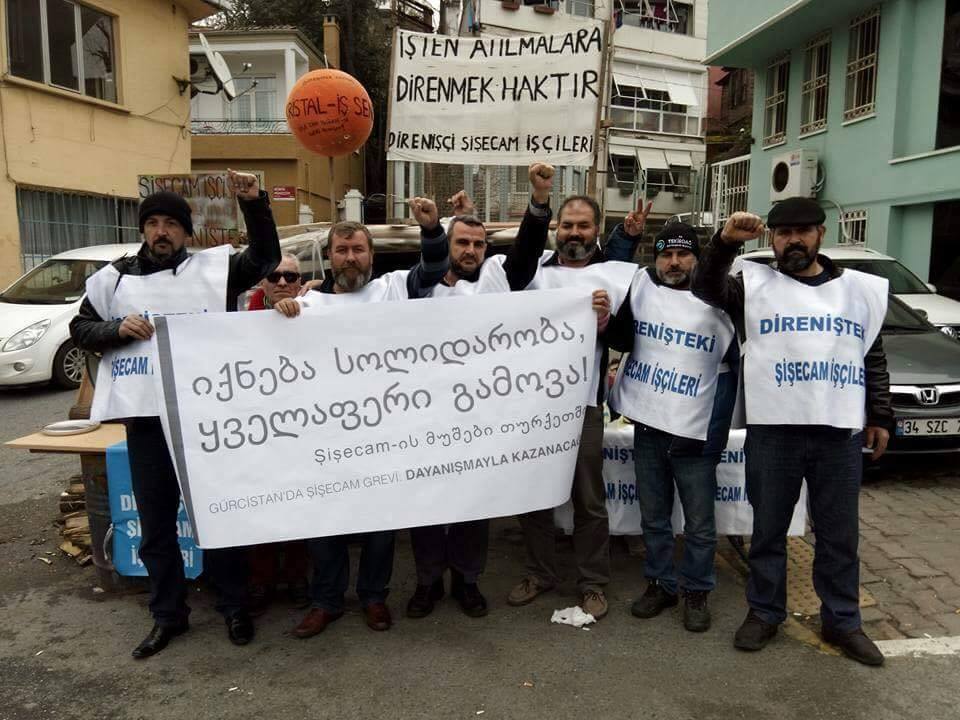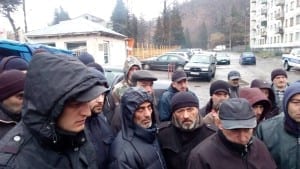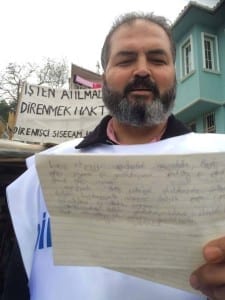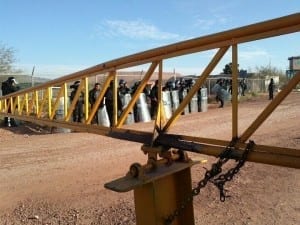
Mar 17, 2016
In Georgia, coal miners in Tkibuli and glass factory workers in Ksani recently made big gains at the workplace with the assistance of the Metal Workers, Miners and Chemical Industry Workers’ Trade Union (MMCIWTU) and the Georgian Trade Unions Confederation (GTUC).
Despite tough opposition from their employers, both groups of workers waged successful strikes and won significant wage increases, with miners also gaining key job safety and health improvements.

Miners in Georgia won key contract demands, including a wage increase and improved job safety and health. Credit: MMCIWTU
Some 750 miners went on strike in February, seeking wage increases promised during their last strike in 2011. The workers, employed by the Georgian Industrial Group (GIG), which operates two mines in Tkibuli, walked out before notifying union leadership of their intention.
But with GTUC President Irakli Petriashvili and MMCIWTU President Tamazi Dolaberidze at the bargaining table, miners returned to work in 16 days with a new contract that includes a 7 percent pay increase starting March 1 and an additional 3 percent hike beginning April 1—and will be paid for half of the days they spent on the strike with no punishment for strike leaders. The company also has agreed to address salary imbalances.
GIG supplies coal from Tkibuli primarily to cement-producing factories in Georgia and is one of the country’s largest corporations, with operations in energy generation, natural gas and real estate.

JSC Mina factory workers received wide international support for their strike. Credit: MMCIWTU
At the JSC “Mina” glass container factory, 170 workers—80 percent of the workforce—went on strike February 5 after months of contract negotiations which stalled when the company did not address workers’ key issues, including a wage increase.
Throughout the 30-day strike, glass workers won wide international support, with employees of the JSC Mina Turkey-based parent company, Sisecam, holding a solidarity action backing striking workers. The Sisecam workers also sent their Georgian brothers and sisters a message: “Workers of “Mina” are symbol of fight for just cause, wherever human rights are violated we should be there and fight together!”
The global union federation IndustriALL, the Eurasian Metal Workers Federation, the Turkish union DISK and unions in Ukraine, Russia, Belarus, and Kyrgyzstan sent protest letters to the company and support letters to the glass workers. GTUC affiliate organizations and non-governmental organizations also backed the workers.
Petriashvili and Dolaberidze ultimately negotiated a 7.5 percent pay increase beginning January 1, 2017, and the company agreed to the workers’ demand for a location to hold union activities.
Feb 28, 2014

Miners at the El Coronel mine in Zacatecas, Mexico, voted to join the union Los Mineros. Photo: Julia Quiñonez
Mineworkers at the El Coronel gold mine in Zacatecas, Mexico, have voted to join the National Union of Mine, Metal, Steel and Similar Workers of the Mexican Republic, known as “Los Mineros” or SNTMMSSRM in Spanish, with 425 workers voting for the union to be its bargaining representative.
A team of international observers from non-governmental organizations and unions monitored the election and reported that the “voting on February 21 was conducted in a substantively fair and transparent manner, free of interference from the employer or government officials.”
Three unions were represented on the ballot, including Los Mineros. As it has done on previous occasions when there is concern of violence or vote-rigging, the Solidarity Center convened an international team of observers to ensure that the voting process was fair. The team served as a visible presence seeking to reduce the risk of any clashes, intimidation, or harassment and to detect any irregularities in the process that could have hindered the successful completion of a free election. Members of the independent observation team are all trained and experienced in international protocols for election observation, such as only interviewing workers after they have voted and not asking workers which union they voted for or other personal information.
The team included representatives of the Solidarity Center, United Steelworkers (USW), Border Committee of Women Workers (Comité Fronterizo de Obrer@s (CFO), the Project on Organizing, Development, Education and Research (PODER) and Project for Economic, Social and Cultural Rights (ProDESC).
More details about the campaign are available from the USW.
Sep 12, 2012
On Friday, August 31, the United Workers Union of Liberia (UWUL) signed an historic collective bargaining agreement with the largest mining multinational in Liberia.
The agreement—retroactive to April 1, 2012—includes salary increases and improved benefits. It also codifies a system of labor relations at all the multinational’s facilities, setting up avenues for labor-management dialogue in areas such as health and safety, and conflict resolution.
Workers covered by the agreement are located in Nimba County, Monrovia and the port of Buchanan. UWUL Local #4 will represent workers covered under the new agreement. The multinational, which is also the world’s largest steel and mining corporation, was Liberia’s first post-war major mining investor. It began operations in the shuttered facilities of the former Liberian-American-Swedish Minerals Company in 2007.
Although negotiations on the agreement began in November 2011, workers began an organizing drive in 2007. In 2009, they democratically elected leaders at the Nimba, Buchanan and Monrovia worksites. After the first iron ore shipment was announced in September 2011, workers and company representatives returned to the bargaining table.
Given that a number of other mining companies have set up operations in Liberia in recent years, UWUL hopes this agreement will set a standard for freedom of association and labor-management relations in the Liberian mining sector.
Since 2007 the Solidarity Center and the United Steelworkers (USW) have been working with UWUL’s leaders and shop stewards on the role and duties of shop stewards, and on negotiation strategies.
This agreement comes roughly four years after a groundbreaking collective agreement between Firestone Natural Rubber Liberia and the Firestone Agricultural Workers Union of Liberia (FAWUL). That collective bargaining agreement resulted in several positive changes at the hugely influential rubber farm, including pay increases and an end to child labor.




